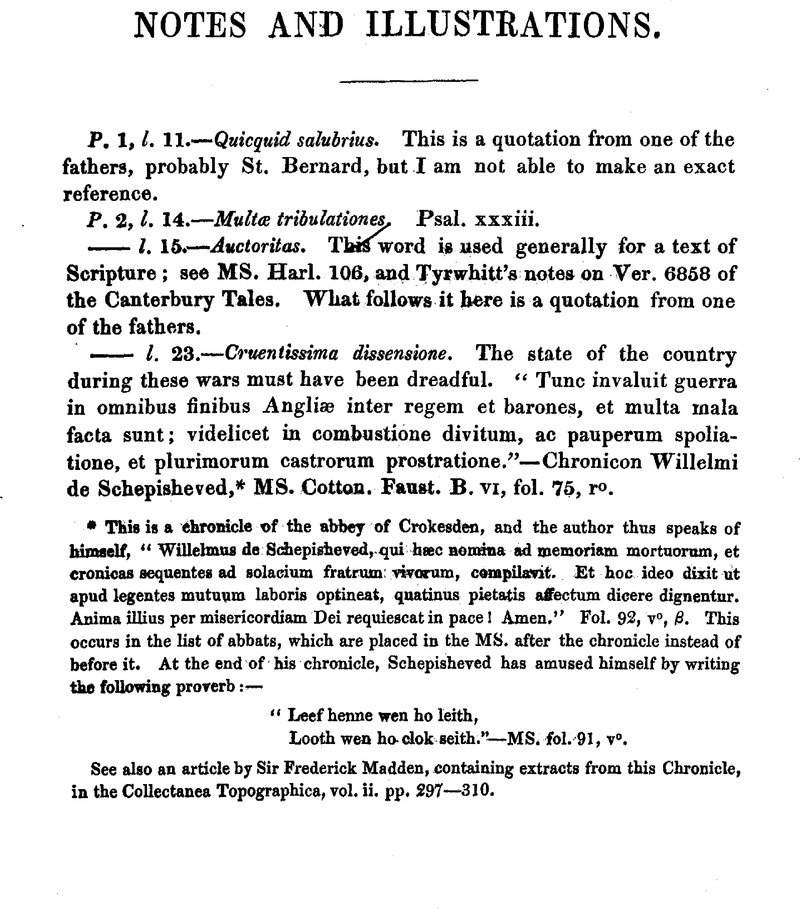No CrossRef data available.
Published online by Cambridge University Press: 23 February 2010

page 111 note * This is a chronicle of the abbey of Crokesden, and the author thus speaks of himself, “Willehnus de Sdiepisheved, qui hæc nomina ad memoriam mortuornm, et cronicas sequentea ad solarium fratrum vivorum, campilant. Et hoc ideo dizit ut apud legentes mutuum laboris optineat, quatinus pietatis affectum dicere dignentur. Anima illius per misericordiam Dei requiescat in pace 1 Amen.” Fol. 92, v°, β. This occurs in the list of abbats, which are placed in the MS. after the chronicle instead of before it. At the end of his chronicle, Schepisheved has amused himself by writing the following proverb:—
“Leef henne wen ho leith,
Looth wen ho-clok seith.”— MS. fol. 91, v°.
See also an article by Sir Frederick Madden, containing extracts from this Chronicle, in the Collectanea Topographica, vol. ii. pp. 297—310.
page 112 note * See also the Scalacronica, ed. Stevenson, p. 101. The high price of provisions, however, according to Matthew Paris, was not so much owing to scarcity, as to the immense sums of money that the Earl of Cornwall had taken out of the country; Paris, p. 958, and Tyrrell, ii. (977.) This Earl's immense riches caused the following epigram,
“ Nummus ait, pro me
Nubit Cornubia Romæ.”
Cf. MS. Harl. 4878, fol. 76, v°.
page 113 note * It will be seen that Taxter does not state the price of corn to be so high as the two authorities above stated, which is easily to be accounted for by his living in another part of the country. Taxter's Chronicle has not been printed, although curious and valua ble there are two complete MSS. of it, viz. MS. Cotton. Julius, A. i. and MS. Arundel. Coll. Arm. No. 6. From the former of these, fol. 37, v°, and from the latter fol. 123, r°, α, we learn that Taxter became a monk of Bury St. Edmund's in the year 1245:— “Hoc anno scriptor præsentis voluminis habitum suscepit monachalem dominus de Tayster, die Sancti Edmundi, M.cc.xlv.” Owing to Taxter having made use of two eras, this date has been hitherto mistaken for 1277 by all writers who have had occasion to speak of him. For the same reason, the catalogues state that the, chronicle extends to the year 1287, whereas in point of fact the narration in both manuscripts concludes with the account of the battle of Evesham in 1265. Sharon Turner falls into the same error, Hist. i. 440. The first portion of Taxter's Chronicle is taken from Marianus Scotus.
page 115 note * Cap. xlvii. vers. 6.
page 126 note * Much discussion has arisen on the real composition of the Greek fire; a curious early receipt for making it is in MS. Arundel. 164, fol. 192, v°.
page 132 note * The battle of Lewes was necessarily a source of great rejoicing to the adherents of Leicester, and of as much regret to the royalists. Capgrave, in his interesting little volume “de laudibus Henricorum,” says—“Taceo hie de multis infestationibus baronum erga dictum regem, et specialiter de bello apud Lews.”—MS. Cotton. Tiberius, A. viii. fol. 51, r°; and MS. C.C.C.C. No. 408. “Comes vero Leycestriæ, potitus victoria, regem Angliæ circumduxit sibi et suis emolumentis, et regi tantum nomen reservaus.”—Chronicon Stephani Birchington, MS. Harl. 4231, (5,) fol. 21, r°.
page 133 note * “Consilio Edwardi primogeniti sui et Ricardi fratris sui comitis Cornubiæ, misit ad curiam Romanam ut a voto illo absolveretur.”—Chron. Bermond. MS. Harl. 231, fol. 40, r°
page 134 note * It was not the Barons alone who complained of Henry's waywardness. The Pope complained sadly of him—“partem Comitis et Baronum tenuistis approbando, laudando, commendando facta ipsorum et negotia quæ gerebant de regimine regni et curia regis. Et hoc est notorium etpublicum.”—MS. Cotton. Tiberius, A. ix.fol. 39, r°, β.
page 134 note † Cf. MS. Chron. tr. ex codice Barb, in Bibl. Vat. torn. iii. p. 133; Chron. Hagneb. MS. Cotton. Vespas. B. xi. fol. 34, v°; MS. Harl. 4690, fol. 50, v°,α; MS. Harl. 6359; MS. Chron. Barthol. de Coton; Wright's Political Songs, p. 72, &c.
page 135 note * This is a transcript from MS. Cotton. Otho, B. iii. which was nearly destroyed in the fire of 1731. It contains a curious chronicle, written in London, and in the earlier part abridged from Matthew of Westminster.
page 135 note † The King came to Lewes on Sunday the 11th of May.—MS. Bib. Reg. 13 C. VI. fol. 63, r°. β.
page 139 note * “Dune nageres apres en la secunde none de Aust, ke est l'endemein de l'invenciun de seint Estephene, la bataile se prist à Evesham, où occis estoit le diet cunte de Leicestre Simun, sire Henri sun fiz, et sire Hughe le Despenser chief justice d'Engleterre, et plusurs autres à chival et à pié tresgraunt numbre. E pur lure verité et la pé de la tere tuz morirent, les miracles ke ilukes surviegnent apertement bien çeo tesmoignent.”—Chron. Eccles. Christi Cantuar. MS. Harl. 636, fol. 216, r°, β.
page 144 note * This is a quotation from the well known verses de Anglia which occur in the Polichronicon, p. 193.
page 151 note * I quote the MS. by this title, but there is no authority for so doing. From fol. 185, r°, a, and other places, it appears that it was written in the monastery of Malmsbury. The MS. Cotton. Cleop. D. ii. and MS. Trin. Coll. Cantab. R. vii. 2, appear to contain similar chronicles. See Mr. Hunter's report on the Cambridge libraries, p. 340.